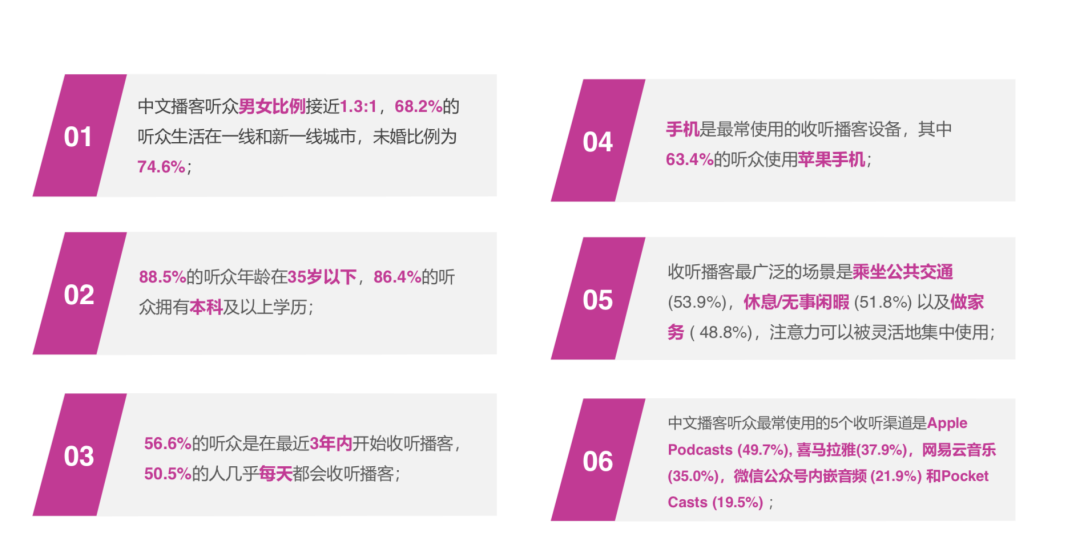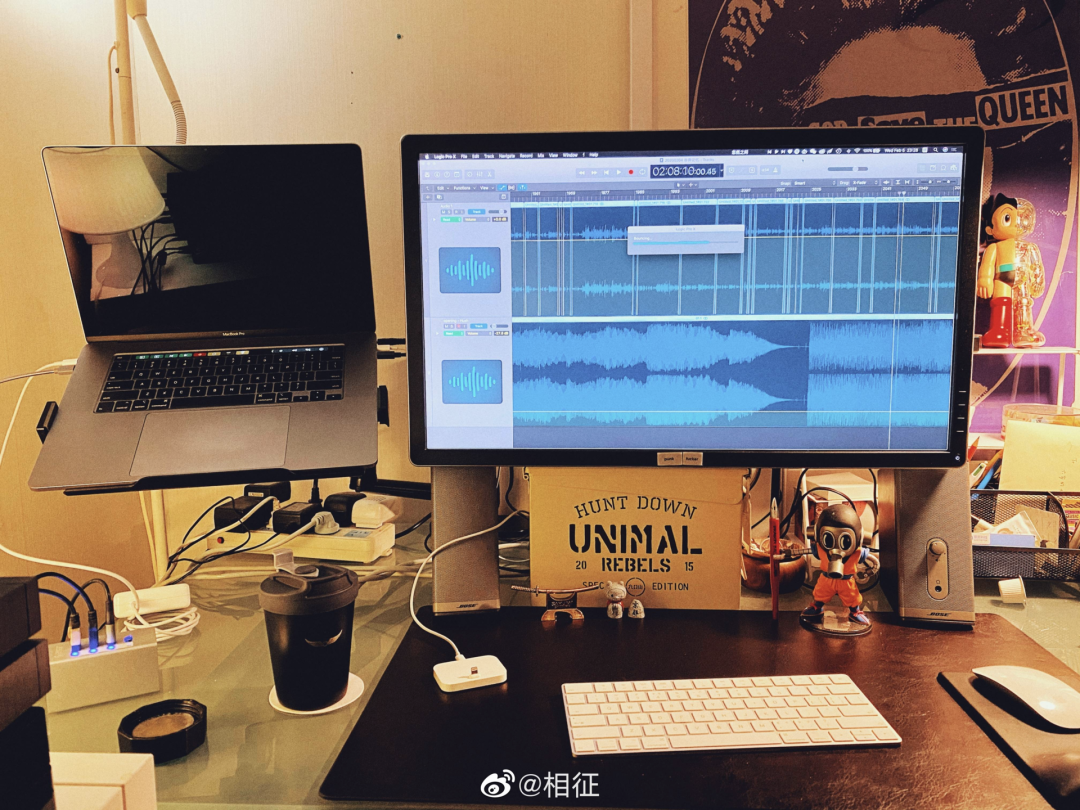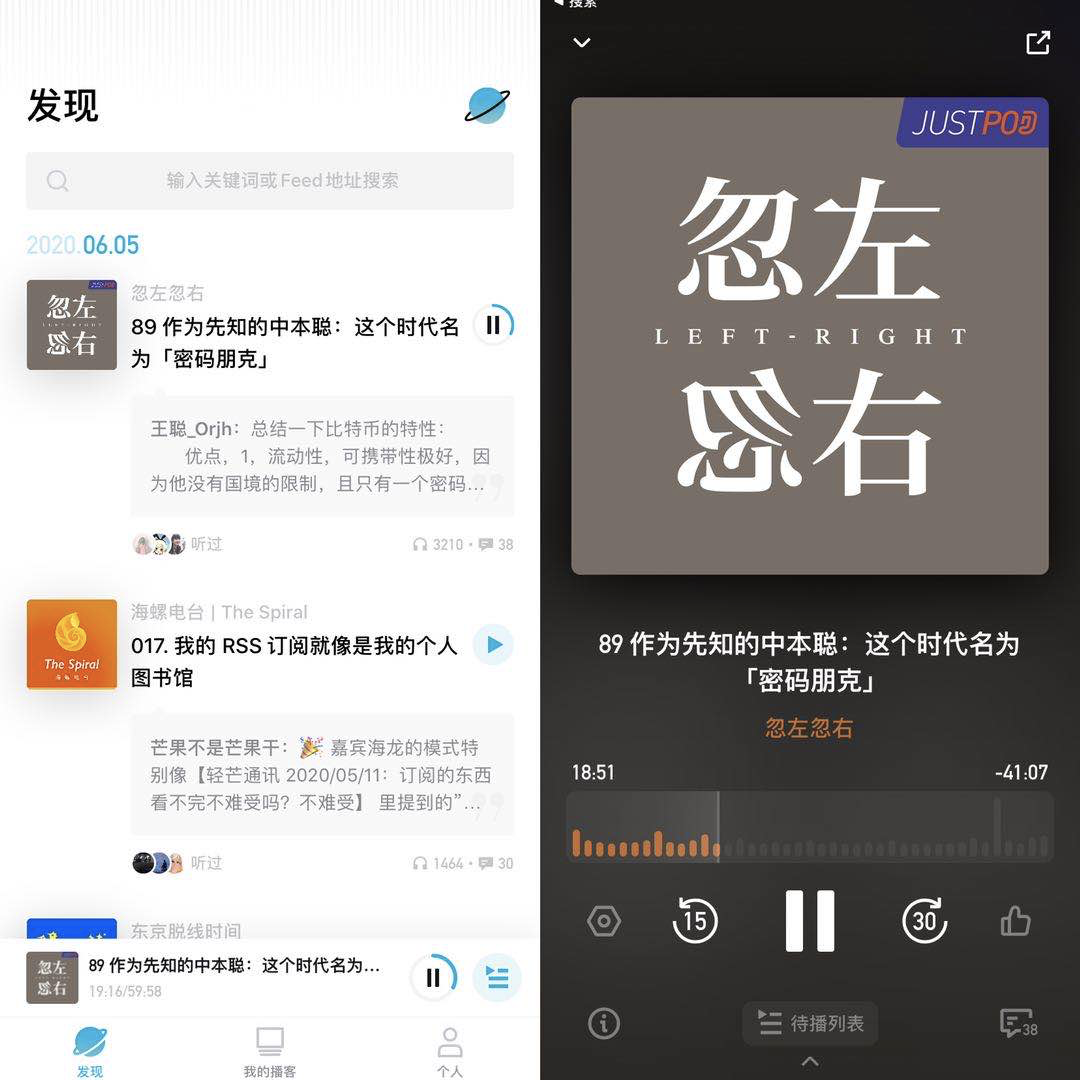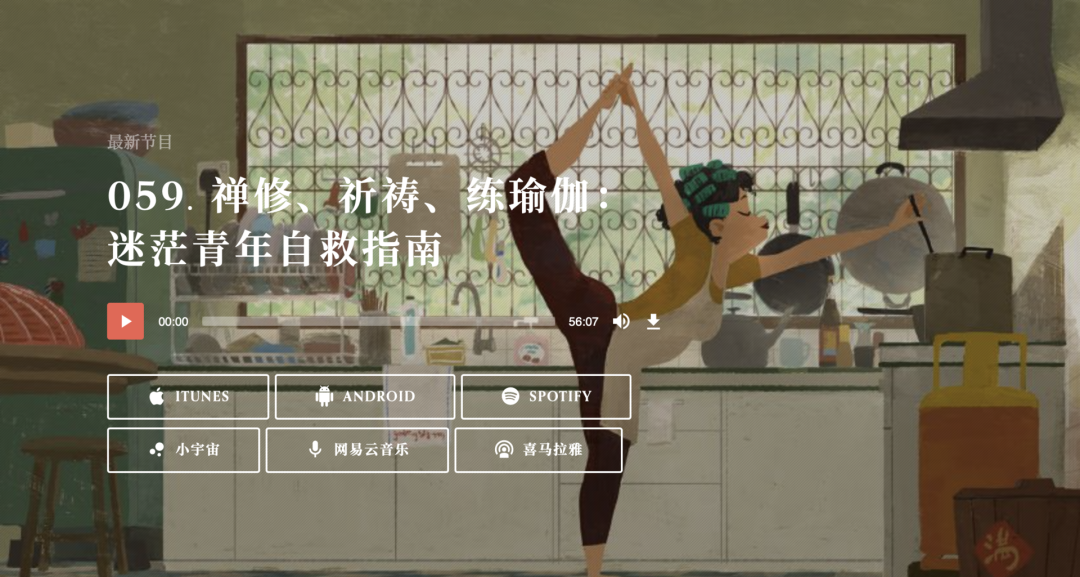Everyone is “nonsense” and then live.
Editor’s note: This article href=”https://mp.weixin.qq.com/s/rLsxDr9U43UPK2s264r3hg”> “iFeng technology” from the micro-channel public number , Author: Zheng Yuan.
Publisher: In-depth report team of “Wind Eye” Phoenix Network Technology Phoenix News Client
Important tips:
1. When a US podcast show sold for a high price of US$100 million, most of China’s podcast shows are still “generating power for love”, and there are only a few commercial and corporate podcast shows.
2. In the past few months, podcast user data has improved, but in the fiercely competitive track of Internet companies, podcasting is a niche content that has never been put on the table.
3. When short videos, live broadcasts, and variety gossip are full of audio-visuals, podcasts have become a spiritual refuge for a group of people. They have deep spiritual needs and are curious about the world, even if Chinese podcasts are far from breaking the circle. The moment of eruption.
Speaking of an independent podcast after 00
“Everyone is addicted to station B after 00” may be an illusion, at least Meng Ni born in 2000 thinks so.
From contacting the medium of podcasting to creating your own podcasting site and becoming a host, Meng Ni spent only half a year. “We have opinions on social issues. We want to do something valuable. As young people, we don’t want to be silent.”
Meng Ni is a sophomore major this year. She is an English translation student. She and her partner self-taught built the website in half a month and launched the first program. “Being a podcaster is a very complicated process. You have to build a website, edit, upload audio, and add RSS links.” Now that Meng Ni and her partner have more than 200 subscriptions, she says she is “happy to die.”
Every day, there are young people like Meng Ni who join the podcast anchor. According to the statistics of the podcast search engine Listen Notes, as of May 2020, the number of Chinese podcasts has exceeded 10,000; in April alone, on average, more than 10 Chinese podcasts were added every day.
Beside Meng Ni, there is a group of people who are willing to output their opinions and share their thoughts on public events and look forward to colliding with more people. At the other end of the podcast show, the listeners come from a discrete online world. They are full of curiosity. By subscribing to the show, they get companionship and trigger thinking and discussion from the podcast topic.
The so-called “podcast” refers to an Internet-based, downloadable aggregate audio file published using RSS and other technologies. Podcast is literally translated as “podcast” in the Chinese world. The word comes from Apple’s iPod and radio ( Broadcasting).
Podcasting is a kind of UGG content, which can be understood as audio self-media. Two or three people sit together and chat about a topic. It is a common form of Chinese podcasting. Compared with short videos and live broadcasts, podcasts are counter-current, with a short time of 30 minutes and a long time of two hours. They cannot bring direct sensory stimulation and belong to the “cold medium” that needs to mobilize thinking. But the number of young people listening to podcasts is slowly and steadily increasing.
The founder and anchor of “Dai Nei Tan Tan” observed that in the past period of time, the number of listeners has grown “rarely and surprisingly”, “In the past three months, the number of our listeners has increased Nearly 30%, this has not happened in the past year or two.”
“Inside Secret Chat” was founded in 2014. It is a talk show podcast program for music and entertainment. It is also the earliest commercial podcast program in China. According to Podcast data, each episode of “Dai Nei Tan Tan” has more than 3 million ports of broadcast. “This shows that the public has become more and more aware of podcasts,” the anchor explained.
An obvious fact is that in addition to the 15-second small video, 140-word Weibo, and beautifully packaged public account articles, the undefined, open and niche media form of podcasting has gradually started A group of young people who love to communicate and share ideas ferment and grow.
The survey report released by PodFest China shows that broadening horizons, exploring the unknown, satisfying curiosity are the main demands of podcast listeners, and commuting, leisure, and housework are the most commonly used scenarios. Relatively short videos, Chinese podcasts are a vertical to almost unprofitable content category, but in the survey, 90% of listeners expressed support for the commercialization of podcasts.
Source: PodFest China “2020 Chinese Podcast Audience and Consumer Survey”
Compared to English podcasts with well-developed users, content, and markets, the current Chinese podcast group is more like a utopia where voices and opinions intertwine. Institutional podcasts and independent podcasts coexist, and there are fewer in long or short programs. Realistic anxiety and utilitarianism add more space for discussion and spiritual discussions.
Behind this, the question that is worth thinking is, will the Chinese podcast, which looks sub-cultural and non-mainstream, become the next public opinion field gathered by KOL? Would be marketing that has not yet been exploredTreasure? Or, will Chinese podcasts break?
the existence of business logic violations
If you casually ask someone on the street, “Do you listen to podcasts?”, there is a high probability that you will get a negative answer. Niche is the common perception of podcasts.
What is a podcast? “Wet goods”-the anchor Li Ruyi first used the term to describe podcast programs, referring to useless and subjective, but at the same time warm, powerful and emotional content.
According to the symbiosis of “Inside Secret Talk”, the spiritual core of podcasting is hippie and punk, breaking the existing rules, “This (podcasting) is a very Internet-spiritual thing”. It has been done for 7 years.
In 7 years, “Dai Nei Tan Tan” changed from a few people’s hobby to a commercial company, and received millions of angel rounds of financing. This is very rare in the field of podcasting. The vast majority of podcasting starts with interest and expression. There is a stable and loyal listener who is doing energy investment that has nothing to do with income.
Anchor’s workbench Source: Photo courtesy of the interviewee
Overview of Chinese podcast content, including interviews, technology, music, art and other categories. Here, why women do housework, how to use gunpowder in a romantic way, how to fight against bullying and slut humiliation, mainstream or anti-mainstream, are topics that are discussed in depth in podcast programs.
Counting the mainstream Chinese audio applications on the market, only Apple Podcast is an app designed specifically for podcasts. Moreover, it is difficult for you to use the logic of Chinese Internet products to nest on podcasts, because the release of podcast programs has completely different logic from that of NetEase Cloud, Douyin, and Station B.
The production, upload, and distribution of the podcast itself is destined to be niche in China.
Generally speaking, the production of a podcast program will go through the following process. Select a service provider to upload and host the audio file, generate an RSS link, and then distribute to Spotify, Podcast and other general-purpose podcast platforms.
“This is an important feature of podcasting, and the channels for uploading and listening are separate,” said Yang Yi, editor-in-chief of “Podcasting” in the podcast industry media. The vast majority of podcast practitioners believe that this kind of decentralized content distributed through RSS belongs to the ranks of podcasts, and audiobooks and audio lessons do not belong to the category of podcasts.
One of the anchors of “Unemployed Travelers” Zhen Yu also said that there is no platform in China that provides audio paid hosting services like Spreaker and Podbean. In China, Lychee, Himalayan and Dragonfly all provide audio hosting functions. They are also partners of Apple Podcasts in China, but audio hosting services and even free podcast content are not their main businesses.
Another reason for the podcast niche is that its own existence is contrary to business logic-a large part of the anchors are only expressed for expression, and this part of the audience is destined to be limited.
Open an audio app, music records, audio lessons, audio books occupy an important recommended position. Although programs such as “Left and Right” and “Inside Secret Talk” can be found in Himalayas and Litchi, they are ranked by the major audio platforms after paying for knowledge, audio books, and crosstalk, and are sometimes classified as “radio stations” , “Broadcast” column, very few recommendations exposed.
Podcasts can’t reach the most users, which is also related to the characteristics of the podcast content itself.
Because for the platform, the podcast listeners are small in magnitude, these UGC contents are also facing a difficult dilemma, but this choice is understandable. “Through these contents (audiobooks, radio dramas), the platform gets a larger user market and tens of millions of daily activities, which is more important for a platform.” Yang Yi said.
A staff member of the audio platform appeared to say that at this stage, the podcast UGC content has high information density, and the creators and listeners as a whole are highly knowledgeable, and indeed cannot bring traffic to the platform. “But as more people focus on podcast content, this situation should improve.”
Everyone is “nonsense” and then live
In terms of business logic, podcasting does not bring obvious economic benefits to the platform, but at the user level, podcasting has its own value.
Yang Yi believes that in the boring scenes of commuting, fitness, and housework, users need to be grabbed attention, so they have become the main scene of podcasting, which is a highly concentrated consumption scene.
For Zac, podcasting is his companionship on the commute. “On the one hand, I understand things that I am not familiar with. On the other hand, I need to consume something for commuting. Since coming into contact with podcasts, Zac has been out of control. In the “Independent Podcasting” recommendation account he created, every day someone will contribute to share inspiring programs.
“These shows will guide me to read more books, and they also give me a lot of power,” said Meng Ni. In a podcast show called “Stochastic Volatility”, three female media people discuss neo-liberalism, bio-citizenship, and racism in the show. Each copy of the copy lists a wealth of background information and inspires creative thinking. Of. Meng Ni is their loyal audience.
Meng Ni clearly remembers that after the second anniversary of the “METOO Movement”, “Random Waves” invited Xianzi (Weibo@弦子 and her friends) to the program to discuss how to treat sexual harassment and domestic violence Women, these perspectives have greatly inspired Meng Ni.
Source: Stochastic Volatility
Just like Meng Ni, she also draws strength from podcasts. In the past year, Ruowen has used podcast programs as a way to continuously improve her views and ideas. Because beside her, there is no such deep communication environment.
“Most people find it unnecessary to share in-depth life experiences and ideas with friends in their lives,” Ruowen said. The desire for modern people to communicate in depth is diminishing. “Everyone is nonsense, and then Life.”
“What do you think is the value of podcasting?” Under a question from WeChat, a podcast user replied: In the information environment of “water everywhere but no water to drink”, podcasting seems to be the optimal solution .
Podcasting is a spiritual companion for listeners. Miya, the anchor of “Pillowside”, tells us that listeners’ demand for podcasting is not a social need, but selectively seeks to fit in views, interests, and life experience. Content, let these “kinds” accompany themselves in a sound way, “This is a very delicate and profound connection.”
100 million US dollars VS power generation for love
In May of this year, the well-known streaming platform Spotify bought the podcast show “Joe Rogan Experience” for $100 million. This podcast was born in 2009 and interviewed celebrities such as Musk and Snowden. In China on the other side of the Atlantic, the first Chinese podcast platform “Little Universe” has just been launched for public beta.
Elon Musk as guest podcast show “Joe Rogan Experience”
A stark contrast is that the US podcast market has matured to the point where hundreds of millions of dollars of IP have appeared, and China’s podcast platform is still trying to get started.
According to the “Autumn Podcast Audience Report 2019” released by Westwood One, as of August 10, 2019, about 22% of Americans will listen to podcasts for at least one hour a week, and 8% of them are heavy podcast enthusiasts. , They listen to podcasts for more than 6 hours a week.
Source: Podcast Podcast
In addition to Spotify starting to pay attention to podcast programs, Youtube and Amazon are also investing in podcast projects. According to a report released by media analysis expert Nick Newman, in the United States, advertisers spent nearly $700 million on podcasting in 2019, and by 2021, the value of the podcasting market is expected to exceed $1 billion.
Despite the fact that China’s online audio market has reached 425 million users, China’s podcast content and users are still a group that can’t be smaller. According to the statistics of the podcast search engine Listen Notes, as of May 2020, the number of Chinese podcasts exceeded 10,000, which is far from the total number of 830,000 English podcasts.
In addition to the disparity in quantity, the content of Chinese podcasts is relatively single, focusing more on the pan-cultural field, and the degree of sophistication and commercialization of content is far from enough.
In Zhenyu’s view, foreign radio stations or professional media have produced many high-quality podcasts, such as Up First, Planet Money, Fresh Air under the NRP (National Public Radio), The New York Times produced The Daily, Today in focus produced by the Guardian, etc., have a variety of forms, including narrative, fiction, real crime, news investigation, etc. Relatively speaking, the form of Chinese podcasts is relatively simple, most of them are talks, and the content is more concentrated on culture and emotions. News and serious content are relatively few.
In this case, the internal test of “Little Universe” is still aroused in the Chinese podcast circleNot only small ripples, but also the attention of many technology media-after all, there has never been a domestic Internet platform for podcast listeners before.
It is reported that the head of the small universe APP development team is also the product manager of the company immediately. This product originated in the circle of “listening to podcasts” in the original App community. An operator of Little Universe told us that after observing some of the pain points of listeners and anchors, the public beta of Little Universe was released to verify the mentality of market demand, and the results exceeded expectations.
Source: Little Universe App
“Originally, there were no high expectations, but in addition to the long-term audience approval of many podcasters, we are also liked by many users who are new to podcasting,” she said. As of June 4th, the download volume of Little Universe in the Apple App Store climbed to the 15th place in the music category. On Weibo, more and more users spontaneously joined the ranks of “podcast recommendations”.
In the eyes of Yang Yi, compared to Apple’s Podcast application, “Little Universe” is more in line with the logic of Chinese Internet users. When the platform and content are highly bound, the media attributes of the content are eliminated. The disseminated article in WeChat is “public article”, the 140-word graphic is called “Weibo”, the 15-second video is “Douyin”, and the podcast program can be found in any general-purpose client, lacking a A platform that meets public awareness.
The growth of podcast users brought by Little Universe is far from the point where podcast content has exploded. But many people may start here to accept the content of the medium of podcasting. “Yang Yi said.
The pioneering period of Chinese podcasts
A curious question is, in such a “limited audience” market, how many anchors can feed themselves through podcast programming? In fact, these podcast anchors have a clear understanding: At this stage, being a podcaster is not a thing that can bring huge rewards.
Meng Ni attributed her motivation to be a podcaster to the desire to express—everyone actually has a little more or less expressive desire. Writing, video shooting, and photography are all expressions. She believes that podcast users generally have this desire to express and have a stronger ability to accept new things. She told us that there are still younger people doing podcast programs around her.
“Art Nagging” is a new face that has only recently appeared in the podcast circle.Founded by Lan Yi and Monie, who are studying museums and fine arts education, after noticing the few cases of popular podcasts in Chinese art, they decided to start their podcasting career as a “nag”.
In the podcast show, they met a sympathetic listener, “Being able to do a job that can feed themselves, while using podcasts to continue their interest, so that they have not completely left the art industry, I think it is right for me It makes a lot of sense.”
For Lan Yi and Monie, the anchors of “Art Nagging”, podcasting cannot replace their existing jobs, but only interests outside of work. At this stage, it is not realistic to earn income from podcasting. They enjoy enjoying being a podcaster. The process of systematic learning and progress brings them joy, satisfaction and growth.
The team of the other podcast “Unemployed Travelers” has only obtained extremely meager income from WeChat rewards, and they have been operating for nearly two years.
“I want to select topics, invite guests, record programs, edit and then release and promote the whole process. The whole process will take a lot of time and energy, but I think it is worth the effort. When you and The guests are all devoted to a certain topic. These thinking about the problem and the agitation of different people’s thoughts may bring some unexpected gains, and then change your life or inherent perception of something.”
Source: “Unemployed Travelers”
In addition to these independently produced podcast programs, some organizations have also seen the growth space of podcasts and began to produce professional and recognizable PUGC content. Such as the storytelling podcast “Story FM” under the Elephant Guild, the book review podcast “Reverse Pop” launched by the “Beijing News”, “Island Hopping FM” launched by CITIC Press, and “Bad Sister” launched by “People” magazine Editorial Department, etc.
From the perspective of video UP masters and graphics from media development, podcasts can also rely on fan economy and IP effects to achieve considerable development. An obvious signal is that there are already brands such as Tmall and Starbucks beginning to seek In cooperation with the advertising of podcast programs, podcasting matrices such as JustPod and lively voices have also appeared.
Some of the independent podcasts with institutionalized operation also have a few well-known head podcasts such as “Inside Secret Chat”, “Natural History”, and “Pillow Wind” that can be customized through advertisements, paid peripherals, and e-commerce. Keep up to date.
However, inIn an Internet environment where vibrato, fast hands, and various gossip stimulating nerves, is it really a good business to have a slow podcast? Compared with video, audio has less advantages over visual sense.
A long-time audio business leader of a domestic online music giant unabashedly stated that podcasting in China is only a niche market, and it’s not a big deal. “Different national conditions make it easy to use overseas, but it may not be easy to use domestically.” . The marketing department of a well-known Internet company also revealed that the podcast audience has a limited audience and the rate of return is unknown. At present, public accounts and videos are still the main promotion channels.
Podcasting is obviously still in the wilderness development stage in China, there is no established upstream and downstream of the industrial chain, no large-scale content providers, no cross-scene external marketing window, single commercial realization channel, and the risk of content review . More importantly, China has not yet seen a top-level traffic column that really grows on the podcast soil.
Conclusion
The “ear economy” is no longer a niche, fresh ecology in China. In the first half of 2019, more than half of Internet users in China used online audio apps. On January 17, 2020, Lichee, which started with audio UGC content, officially landed on NASDAQ, becoming the first domestic online audio company. On April 23 this year, Tencent Music released a long audio strategy, and at the same time launched a new long audio product Kuwo Listening.
As a more subdivided category of audio content, how far is the Chinese podcast from the circle? The answer of most practitioners is conservative: “Not worth mentioning”, “It’s too early.”
A senior podcaster believes that from the perspective of the commercial order of podcasting, it is far from being an industry. Even so, there are still people from all walks of life who enter the field with enthusiasm regardless of the benefits.
“The barrier between traditional broadcasting and independent podcasting is being broken, more and more brands are beginning to see the value of podcasting, and I believe that the day when podcasting breaks will soon come”, a podcast practitioner Say so.
Editor: Yu Hao
WeChat editor: Yang Qian
(Intern Shu Yiran also contributed to the text)






